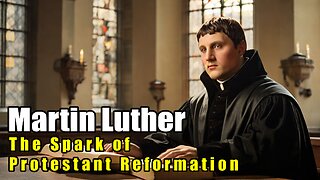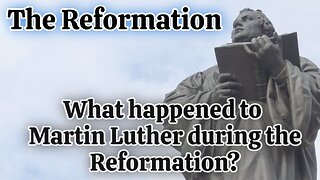Episode 1317 St John Fisher verses Martin Luther
I am dedicating this episode to my sister Genny.
Today is the feast day of St John Fisher so let me contrast him to Martin Luther
The two mens roles in the Protestant Reformation. One man created the break from the Mystical Body of Christ an the other went to his death in its defense.
There were Two men that became saints because of King Henry 8th and the protestant reformation that was caused by Luther and they were St John Fisher (Bishop) and St Thomas More. Since today is St John Fishers feast day, I will focus on him and compare and contrast him to Martin Luther.
St. John Fisher was a Catholic bishop and theologian who was executed by Henry VIII for refusing to acknowledge that the king as head of the Church of England. Martin Luther was a German Augustinian monk who sparked the Protestant Reformation by challenging the authority of the Catholic Church.
Fisher was a learned and eloquent defender of the Catholic faith, while Luther was a passionate and charismatic preacher who appealed to the emotions of his heretical followers.
Here are the differecnes between Fisher and Luther responded.
Fisher chose to remain faithful to the Catholic Church, even when it meant facing death. Luther, on the other hand, broke with the Church and founded his own Protestant movement. Fisher's example is still relevant today. Fisher's commitment to truth and his willingness to suffer for his beliefs are an inspiration to all Catholics and call out to fallen away Catholics to return to the mystical body of Christ.
Fisher was a close advisor to Henry VIII and was instrumental in the king's early marriage to Catherine of Aragon.
Luther was a theologian, but he was also impulsive and often reckless.
The Protestant Reformation was a complex event with many causes.
Fisher and Luther were both products of their time, but they also had very different personalities and approaches to the challenges of their day.
St. John Fisher
Born in 1469 in Beverley, England
Studied at Cambridge University
Ordained a priest in 1491
Appointed Bishop of Rochester in 1504
One of Henry VIII's closest advisors
Defended the Catholic faith against the teachings of Martin Luther
Executed by Henry VIII in 1535 for refusing to acknowledge the king as head of the Church of England
Martin Luther
Born in 1483 in Eisleben, Germany
Studied at Erfurt University
Ordained a priest in 1507 (Fisher was a Bishop 3 years prior to Luther becoming a Priest)
Became a professor of theology at Wittenberg University in 1512
Challenged the authority of the Catholic Church in 1517
Founded the Protestant Reformation
Died in 1546 (9 years after the execution of Fisher)
Here is a table that summarizes the key differences between St. John Fisher and Martin Luther:
St. John Fisher's legacy
Fisher is also remembered for his scholarship and his writings. He was a prolific author, and his works on theology and philosophy are still studied today. Fisher was also a gifted diplomat, and he played a key role in the negotiations between England and France.
Martin Luther's legacy
Martin Luther is remembered as the father of the Protestant Reformation. His Ninety-Five Theses challenged the authority of the Catholic Church, and they sparked a movement that would eventually lead to the division of Christianity into Catholic and Protestant branches.
He is revered by Protestants as a champion of freedom of conscience, but he is also criticized by Catholics for his break with the Church.
St. John Fisher's legacy
Fisher's legacy is one of courage and conviction. He was willing to die for his beliefs, even when it meant facing the wrath of King Henry VIII. His death was a powerful witness to the truth of the Catholic faith, and it helped to inspire others to stand up for what they believe in.
Fisher's legacy is also one of scholarship and learning. He was a brilliant theologian and philosopher, and his writings are still studied today. His work helped to shape the Catholic Church's response to the Protestant Reformation, and it continues to be an inspiration to Catholics around the world.
Martin Luther's legacy
Luther's legacy is one of heretical change and transformation. His Ninety-Five Theses challenged the authority of the Catholic Church, and they sparked a movement that would eventually lead to the division of Christianity into Catholic and Protestant branches. Luther's ideas about salvation by faith alone, the authority of the Bible, and the nature of the Church took many souls away from the mystical body of Christ to the road of perdition.
Here is a summary:
The 95 Theses, also known as Disputation on the Power and Efficacy of Indulgences, were a list of propositions written by Martin Luther in 1517. These theses were meant to critique certain practices of the Roman Catholic Church, particularly the sale of indulgences. While the exact content and number of theses may vary in different sources, here is a summary of the main points that Martin Luther addressed:
Top 10:
1. Luther questioned the authority of the pope and the practice of papal infallibility.
2. He criticized the selling of indulgences as a means of obtaining forgiveness for sins.
3. Luther disputed the idea that buying indulgences could release souls from purgatory.
4. He rejected the belief that the pope had the power to grant salvation or remission of sins.
5. Luther argued that true repentance and faith in Jesus Christ were the means of obtaining forgiveness.
6. He challenged the idea that the church's treasury of merits could be accessed through indulgences.
7. Luther questioned the practice of priests offering forgiveness for sins in exchange for money.
8. He rejected the notion that indulgences provided a guarantee of salvation.
9. Luther criticized the wealth and luxury of the church, which he believed should be focused on the poor and needy.
10. He emphasized the importance of the Bible as the ultimate authority for Christians, rather than the traditions and teachings of the church.
These are just a few examples of the issues Luther raised in his 95 Theses. They sparked a major movement known as the Protestant Reformation and had a profound impact on the religious and cultural landscape of Europe.
Luther's legacy is also one of controversy. His break with the Catholic Church was seen by many as a betrayal, and his ideas about salvation were seen as dangerous and heretical.
The challenges of their legacies
The legacies of St. John Fisher and Martin Luther are also challenging. Fisher's legacy of courage can be difficult to emulate, especially in a world where it is often easier to conform than to stand up for what we believe in. Luther's legacy of change can be disruptive, and it can be difficult to find a balance between tradition and innovation.
The impact of their legacies on the Catholic Church
The legacies of St. John Fisher and Martin Luther had a profound impact on the Catholic Church. Fisher's death helped to solidify the Catholic Church's position in England, and his writings helped to shape the Catholic Church's response to the Protestant Reformation. Luther's break with the Catholic Church led to the division of Christianity into Catholic and Protestant branches, and his ideas about salvation by faith alone challenged the Catholic Church's traditional understanding of salvation.
The impact of their legacies on Protestantism
The legacies of St. John Fisher and Martin Luther also had a profound impact on Protestantism. Fisher's writings helped to shape the development of Catholic theology, and his example of courage and conviction inspired many Protestants. Luther's ideas about salvation by faith alone, the authority of the Bible, and the nature of the Church became the foundation of Protestant theology.
The legacy of hope
The legacies of St. John Fisher and Martin Luther are a reminder that hope is always present, even in the darkest of times. Fisher's death was a tragedy, but it also inspired others to stand up for what they believe in. Luther's break with the Catholic Church was a time of great division, but it also led to a new era of religious freedom.
The legacies of St. John Fisher and Martin Luther are complex and contested, but there is no doubt that they both made a significant impact on the course of Western history. Their ideas about faith, the Church, and the Bible continue to shape the way that we think about Christianity today, and they offer a message of courage, conviction, and hope for all people.
The legacy of dialogue and understanding
The legacies of St. John Fisher and Martin Luther are a reminder that dialogue and understanding are essential for building a more just and peaceful world. Fisher's willingness to engage in dialogue with Luther, even though they disagreed on many points, is an example of how people of different faiths can come together to find common ground. Luther's ideas about the priesthood of all believers and the importance of individual conscience challenged the traditional authority of the Church, but they also helped to open up new possibilities for dialogue and understanding between Christians.
The legacy of social justice
The legacies of St. John Fisher and Martin Luther are a reminder that faith must be accompanied by action. Fisher's work as a diplomat and his writings on social justice show how faith can be used to promote peace, justice, and compassion. Luther's ideas about the importance of good works and the need to care for the poor and the marginalized helped to inspire the Protestant social gospel movement.
Fisher was a skilled diplomat who served as ambassador to France and Spain. In these roles, he worked to promote peace and understanding between England and its European neighbors. He also wrote extensively on social justice, arguing that the Church has a responsibility to care for the poor and the marginalized.
Fisher's work as a diplomat and his writings on social justice show how faith can be used to promote peace, justice, and compassion. Fisher's "example shows that faith can be a force for good in the world, and that Christians have a responsibility to work for peace, justice, and compassion."
Catholic theologian Michael Ramsey wrote that Fisher was "a man of peace and justice" who "used his talents as a diplomat to promote peace between England and its neighbors."
The historian Eamon Duffy has also written about Fisher's legacy, arguing that he was "a champion of the poor and the marginalized" who "used his writings to challenge the Church to be more responsive to the needs of the poor."
Fisher's work as a diplomat and his writings on social justice show how faith can be used to promote peace, justice, and compassion. His example is an inspiration to Christians who are working to make the world a better place.
The legacy of hope for the future
The legacy of St. John Fisher are a reminder that hope is always present, even in the darkest of times. Fisher's death was a tragedy, but it also inspired others to stand up for what they believe in.
Luthers errors were pointed pointed out by Fisher as follows:
• Luther's doctrine of justification by faith alone was not supported by Scripture and that it leads to a distorted view of God's grace.
• Luther's rejection of the authority of the Catholic Church. Luther's rejection of the authority of the Catholic Church was based on a misunderstanding of Scripture and that it has led to the fragmentation of Christianity.
• Luther's teaching on the priesthood of all believers. Davies argues that Luther's teaching on the priesthood of all believers is not supported by Scripture and that it has led to a decline in the authority of the ordained ministry.
Luther's theology has had a negative impact on society. Luther's teaching on justification by faith alone has led to a decline in moral standards and that his rejection of the authority of the Catholic Church has led to a rise in secularism.
What is so interesting is the ideas of Luther are not supported by Scripture and that they have led to a distorted view of God's grace, a decline in the authority of the ordained ministry, and a rise in secularism.
Luther's theology was motivated by a desire to escape from the authority of the Catholic Church. He writes that Luther was "a deeply troubled man" who was "looking for a way to escape from his own conscience." Luther's theology was a "cop-out" that allowed him to justify his own sinfulness.
Luther's theology is "a false gospel" that has led to "a great deal of harm" in the world. He writes that Luther's theology "has led to the division of Christianity, the decline of moral standards, and the rise of secularism." Davies urges his listeners to "reject the errors of Martin Luther" and to "return to the true gospel of Jesus Christ."
Davies's talk was a critical and controversial analysis of Luther's theology. Some scholars have argued that Davies is correct in identifying the errors in Luther's theology, while others have argued that Davies is too harsh in his criticism. However, Davies's talk has been influential among some Catholic circles. His book, Rescuing the Reformers, has been translated into several languages and it is widely read by Catholics who are interested in the Protestant Reformation.
Here are some of the key points that Davies made in his talk:
Luther's doctrine of justification by faith alone is not supported by Scripture.
Luther's doctrine of justification by faith alone is not supported by Scripture. The Bible teaches that justification is a gift from God that is received through faith, but that it is also a gift that is received through good works.
For example, in Ephesians 2:8-9, Paul writes, "For by grace you have been saved through faith, and that not of yourselves; it is the gift of God, not of works, lest anyone should boast."
"For by grace you have been saved through faith, and this is not from yourselves; it is the gift of God, not from works, so that no one may boast."
However, in James 2:24, James writes, "You see that a man is justified by works and not by faith alone."
"You see that by works a man is justified, and not by faith only."
These two passages cannot be reconciled, and that Luther's doctrine of justification by faith alone is therefore not supported by Scripture. Luther's doctrine leads to a distorted view of God's grace, as it suggests that God's grace is not necessary for salvation.
Here are some of the key points about Luther's doctrine of justification by faith alone:
• The doctrine is not supported by Scripture.
• It leads to a distorted view of God's grace.
• It is a "false gospel" that has led to "a great deal of harm" in the world.
Luther's rejection of the authority of the Catholic Church was based on a misunderstanding of Scripture.
Luther's rejection of the authority of the Catholic Church was based on a misunderstanding of Scripture. The Bible teaches that the Church is the body of Christ, and that it is therefore an authority in matters of faith and morals.
For example, in Matthew 16:18, Jesus says to Peter, "And I tell you, you are Peter, and on this rock I will build my church, and the gates of hell shall not prevail against it." This passage shows that Jesus gave the Church the authority to teach and govern in His name.
Luther's teaching on the priesthood of all believers is not supported by Scripture.
Luther's rejection of the authority of the Catholic Church led to a decline in the authority of the ordained ministry. He pointed out that the ordained ministry is essential for the Church's mission, and that Luther's rejection of the authority of the Church led to a decline in the number of people who were willing to be ordained.
Here are some of the key points that Davies made about Luther's rejection of the authority of the Catholic Church:
It was based on a misunderstanding of Scripture.
It led to a decline in the authority of the ordained ministry.
It has had a negative impact on society.
Davies's argument is a valuable resource for those who are interested in learning more about the Protestant Reformation and the authority of the Catholic Church. His arguments are well-researched and his presentation is clear and concise. However, it is important to note that Davies's argument is a biased and polemical work. He does not present a balanced or objective view of the issue. As such, it is important to read Davies's argument with a critical eye and to be aware of his biases.
Luther's teaching on the priesthood of all believers is not supported by Scripture.
Luther's theology has had a negative impact on society.
Luther's theology is a "false gospel" that has led to "a great deal of harm" in the world.
Luther's teaching on the priesthood of all believers is not supported by Scripture. He pointed out that the Bible teaches that there is a distinction between the ordained ministry and the laity.
For example, in 1 Timothy 3:1-7, Paul lists the qualifications for the office of bishop. These qualifications include being a man of good character, being a good husband and father, and being able to teach. Davies argued that these qualifications show that the ordained ministry is a special calling that requires certain gifts and abilities.
"Here is a trustworthy saying: Whoever aspires to be an overseer desires a noble task. Now the overseer is to be above reproach, faithful to his wife, temperate, self-controlled, respectable, hospitable, able to teach, not given to drunkenness, not violent but gentle, not quarrelsome, not a lover of money. He must manage his own family well and see that his children obey him, and he must do so in a manner worthy of full respect. (If anyone does not know how to manage his own family, how can he take care of God's church?) He must not be a recent convert, or he may become conceited and fall under the same judgment as the devil. He must also have a good reputation with outsiders, so that he will not fall into disgrace and into the devil's trap."
Luther's teaching on the priesthood of all believers leads to a decline in the authority of the ordained ministry.
He pointed out that if all believers are priests, then there is no need for a special order of ministers. This, he argued, leads to a decline in the authority of the Church and a loss of its ability to teach and govern in the name of Christ.
Here are some of the key points made about Luther's teaching on the priesthood of all believers:
It is not supported by Scripture.
It leads to a decline in the authority of the ordained ministry.
It has had a negative impact on society.
Luther's theology has had a negative impact on society. He pointed to the following as evidence:
The rise of secularism. Davies argued that Luther's doctrine of justification by faith alone led to a decline in the authority of the Church, which in turn led to a rise in secularism.
The decline of moral standards. Davies argued that Luther's teaching on the priesthood of all believers led to a decline in moral standards, as people no longer felt the need to obey the Church's teachings on morality.
The wars of religion. Davies argued that the Protestant Reformation led to the wars of religion, which caused a great deal of bloodshed and suffering.
Here are some of the key points that Davies made about the negative impact of Luther's theology on society:
It led to the rise of secularism.
It led to a decline in moral standards.
It led to the wars of religion.
Luther's theology is a "false gospel" that has led to "a great deal of harm" in the world.
Luther's doctrine of justification by faith alone is not supported by Scripture.
Luther's rejection of the authority of the Catholic Church was based on a misunderstanding of Scripture.
Luther's teaching on the priesthood of all believers is not supported by Scripture.
Luther's theology has had a negative impact on society.
Luther's theology is a "false gospel" because it leads people to believe that they are saved by their own faith, rather than by the grace of God. He also argued that Luther's theology has led to a decline in moral standards and a rise in secularism.
-
 15:28
15:28
CatholicReboot
9 months agoEpisode 1440: St Pope Sixtus III
167 -
 18:59
18:59
CatholicReboot
11 months agoEpisode 1300: St John Francis Regis
213 -
 1:45:57
1:45:57
HandinHandwithGodTv
10 months ago20 Questions with Pastor Mike (Episode 103)
75 -
 1:47:19
1:47:19
HandinHandwithGodTv
1 year ago20 Questions with Pastor Mike (Episode 96)
94 -
 1:33:43
1:33:43
HandinHandwithGodTv
1 year ago20 Questions with Pastor Mike (Episode 87)
69 -
 2:00:00
2:00:00
HandinHandwithGodTv
11 months ago20 Questions with Pastor Mike (Episode 101)
108 -
 2:34
2:34
100 Historical Figures
3 months agoMartin Luther: The Spark of Protestant Reformation (1483 - 1546)
85 -
 1:56:04
1:56:04
HandinHandwithGodTv
1 year ago20 Questions with Pastor Mike (Episode 95)
97 -
 1:56:45
1:56:45
HandinHandwithGodTv
8 months ago20 Questions with Pastor Mike (Episode 106)
278 -
 6:35
6:35
Booksreaderpro
9 months agoWhat happened to Martin Luther during the Reformation? | The Reformation Martin Luther and Beyond
3902